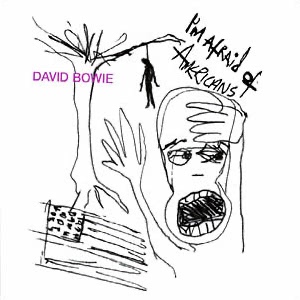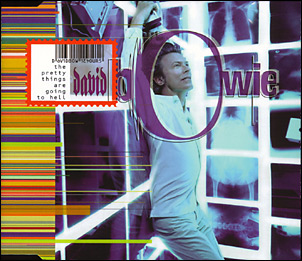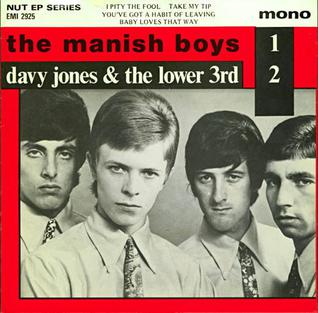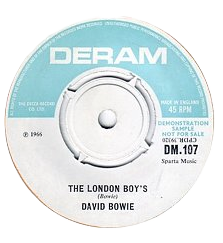Related Research Articles

Earthling is the 21st studio album by the English musician David Bowie, released on 3 February 1997 through RCA Records in the United Kingdom, Virgin Records in the United States, and Arista Records/BMG in other territories. Mostly self-produced by Bowie, it was primarily recorded from August to October 1996 at New York City's Looking Glass Studios. Bowie composed the tracks with Reeves Gabrels and Mark Plati, who are credited as co-producers, with Mike Garson, Gail Ann Dorsey and Zack Alford providing overdubs later.

"I'm Afraid of Americans" is a song by the English musician David Bowie, released as a single from his album Earthling on 14 October 1997 through Virgin Records. The song was co-written by Bowie and Brian Eno and originally recorded during the sessions for Bowie's 1995 album Outside; this version was released on the soundtrack of Showgirls (1995). The song was then remade during the sessions for Earthling, featuring rewritten lyrics, overdubs and transposed verses. An industrial and techno track, it presents a critique of America through the eyes of a stereotypical "Johnny" and is characterised by drum patterns, synthesisers, various loops and vocal distortions.

Heathen is the 23rd studio album by the English musician David Bowie, originally released in Europe on 10 June 2002, and the following day in America. His first release through his own ISO label, it reunited Bowie with producer Tony Visconti for the two's first full-album collaboration since 1980. Recording took place at New York studios from August 2001 to January 2002 and featured guest musicians including Dave Grohl and Pete Townshend. Two tracks, "Afraid" and "Slip Away", evolved from Bowie's shelved Toy project, while three were covers of songs by Pixies, Neil Young and the Legendary Stardust Cowboy.

Hours is the 22nd studio album by the English musician David Bowie. It was originally released on 21 September 1999 through the Internet on the artist's website BowieNet, followed by a physical CD release on 4 October through Virgin Records. It was one of the first albums by a major artist available to download over the Internet. Originating as a soundtrack to the video game Omikron: The Nomad Soul (1999), Hours was the final collaboration between Bowie and guitarist Reeves Gabrels, with whom he had worked since 1988. The album was recorded in mid-1999 between studios in Bermuda and New York City. A song contest conducted on BowieNet in late 1998 resulted in a fan contributing lyrics and backing vocals to one of the tracks.

"I Dig Everything" is a single by the English singer-songwriter David Bowie. It was his final single for Pye Records, released on 19 August 1966. The track was originally demoed with Bowie's then-band, the Buzz, but producer Tony Hatch was unhappy with their efforts and replaced them with session players. It is a pop song that musically and lyrically reflected the mid-1960s Swinging London era. The single was another commercial failure and resulted in the label dropping him. The original recording was included on the Early On (1964–1966) compilation in 1991.

"Cat People (Putting Out Fire)" is a song recorded by the English singer-songwriter David Bowie as the title track of the 1982 erotic horror film Cat People. Bowie became involved with the track after director Paul Schrader reached out to him about collaborating. The song was recorded at Mountain Studios in Montreux, Switzerland in July 1981. Bowie wrote the lyrics, which reflected the film, while the Italian producer Giorgio Moroder composed the music, which is built around only two chord changes.
"Panic in Detroit" is a song written by the English singer-songwriter David Bowie for the album Aladdin Sane in 1973. Bowie based it on his friend Iggy Pop's descriptions of revolutionaries he had known in Michigan and Pop's experiences during the 1967 Detroit riots. Rolling Stone magazine called the track "a paranoid descendant of the Motor City's earlier masterpiece, Martha and the Vandellas' "Nowhere to Run"".

"Stay" is a song by the English musician David Bowie, released on his 1976 album Station to Station. The song was recorded in late 1975 at Cherokee Studios in Los Angeles. Co-produced by Bowie and Harry Maslin, the recording featured guitarists Carlos Alomar and Earl Slick, bassist George Murray, drummer Dennis Davis, pianist Roy Bittan and Warren Peace on percussion. The track features prominent dual guitar work from Slick and Alomar, who mostly composed it in the studio. Based on the chord structure of "John, I'm Only Dancing (Again)", a funk reworking of "John, I'm Only Dancing" (1972), "Stay" emulates funk rock, soul and hard rock. The song's lyrics are abstract and relate to love.

"Survive" is a song by the English musician David Bowie from his 1999 album Hours. It was later released in remixed form as the album's third single on 17 January 2000, reaching number 28 in the UK. Written by Bowie and Reeves Gabrels, it is a reflective number detailing the end of a relationship. Musically, it recalls the sound of Bowie's folk rock music of the late 1960s, and 1971's Hunky Dory. Its music video echoes the reflective quality of the recording, portraying Bowie levitating at a kitchen table with an egg. Praised as a highlight of Hours, Bowie performed "Survive" frequently through 1999 and 2000.

"The Pretty Things Are Going to Hell" is a song by the English musician David Bowie from his 1999 album Hours. Written by Bowie and Reeves Gabrels, its title references past songs such as "Oh! You Pretty Things" and the Stooges' Raw Power track "Your Pretty Face Is Going to Hell". On Hours, the song is a rockier number that contains elements of 1970s glam rock. The lyrics offer views on disillusionment and aging. The song was first released in a different mix in the film Stigmata before being released as the first single from the album in Australia and Japan, replacing "Thursday's Child". An unreleased music video was filmed that depicted Bowie encountering several of his past personas. It was performed live in 1999 and 2000.
"Shadow Man" is a song written by the English singer-songwriter David Bowie. It was first recorded on 15 November 1971 at Trident Studios in London during the sessions for The Rise and Fall of Ziggy Stardust and the Spiders from Mars (1972) and left unreleased. A folk ballad, the lyrics discuss topics of self-identity and doubling, and the impact one's present self has on their future lives, themes some linked to the Shadow concepts of Carl Jung.

"You've Got a Habit of Leaving" is a song by the English singer-songwriter David Bowie, recorded and released as a single on 20 August 1965 through Parlophone. Released under the name Davy Jones, it featured his band at the time, the Lower Third, whose contributions were uncredited. Produced by Shel Talmy and recorded in early July 1965, the single marked a departure from the Americanised R&B of his two earlier singles into Who-style mod music. The original recording later appeared on the compilation albums Early On (1964–1966) (1991) and Nothing Has Changed (2014).

"Can't Help Thinking About Me" is a song written by the English musician David Bowie and recorded with his band the Lower Third. Released as a single by Pye Records on 14 January 1966, it was the first one issued under the "David Bowie" name after previously performing as Davy Jones or Davie Jones. The recording was produced by Tony Hatch, who also contributed piano. The session took place on 10 December 1965 at Marble Arch Studios in London. A rewrite of Bowie's "The London Boys", the song concerns a boy found guilty of an act that decides to leave town to start anew. It is noted by biographers as showcasing Bowie's growth as a songwriter, displaying themes he would utilise in his later work. Musically, the song explores the contemporary mod sound of the Who and the Kinks.

"The London Boys" is a song by the English musician David Bowie. It was first released as the B-side of the single "Rubber Band" in the United Kingdom on 2 December 1966. It was originally written and demoed in 1965 with the Lower Third for potential release as the artist's debut single for Pye Records but it was rejected. After a year of rewrites, he recorded a new version with a new band, the Buzz, which helped secure him a record contract with Decca-subsidiary Deram Records. Unlike the A-side, "The London Boys" retains the Mod feel of Bowie's previous singles. The dark lyrics concern a 17-year-old who leaves home for London and becomes embroiled in the Mod scene, turning to pills to fit in. Like his previous singles, it failed to chart. Decca later issued it as an A-side in 1975..

LiveAndWell.com is a 1999 limited edition live album by David Bowie. It was not available commercially and could only be acquired by being subscribed to BowieNet at the time. The album is made up of recordings from the 1997 Earthling Tour, featuring songs from the albums Outside (1995) and Earthling (1997)

Toy is a studio album by the English musician David Bowie, posthumously released in November 2021. It was recorded from July to October 2000 in New York City and featured re-recordings of songs Bowie recorded between 1964 and 1971, along with a couple of new tracks. The project was co-produced by Bowie and Mark Plati and featured musicians from Bowie's then-touring band—Plati, Earl Slick, Gail Ann Dorsey, Mike Garson and Sterling Campbell—with overdubs from Lisa Germano, Gerry Leonard and Cuong Vu.
"Let Me Sleep Beside You" is a song written and recorded by the English singer-songwriter David Bowie. It was recorded on 1 September 1967 at Advision Studios in London and marked the beginning of Bowie's working relationship with producer Tony Visconti, which would last for the rest of Bowie's career. A departure from the pop and music hall-influenced material of Bowie's 1967 self-titled debut album and other singles for Deram Records, the song displays a more rock-oriented sound with a cello arrangement from Visconti. The impressionist lyrics also depart from Bowie's prior works, describing love using the act of sleeping together rather than through emotional attachment. The song was rejected by Deram for release as a single, purportedly due to the risqué title. It remained unreleased until 1970's The World of David Bowie compilation.
"Silly Boy Blue" is a song written and recorded by the English singer-songwriter David Bowie. Originally demoed in 1965 as a mod-influenced track about a teenage runaway, it was revised in 1966 with new lyrics and released on Bowie's self-titled debut album in June 1967. This version reflects Bowie's fascination with Tibetan Buddhism, featuring various spiritual and geographic references in the lyrics and varied instrumentation such as a trumpet, cello and Chinese gong. Bowie remade the song twice during his stint with the Riot Squad in April 1967: as an instrumental for live performances and acoustically, which has appeared on compilations.
"Karma Man" is a song written and recorded by the English singer-songwriter David Bowie. It was recorded on 1 September 1967 at Advision Studios in London and marked the beginning of Bowie's working relationship with producer Tony Visconti, which would last for the rest of the artist's career. The song expresses Bowie's growing interest in Tibetan Buddhism, concerning a character who is put on display as a "freak" in a carnival tent. The music reflects the Buddhist themes and was likened to the works of the Beatles. Initially proposed as a B-side, it remained unreleased until The World of David Bowie compilation in March 1970. Bowie performed the song during two of his BBC radio sessions, one of which was released on the 2000 compilation Bowie at the Beeb.
References
- 1 2 3 4 5 O'Leary 2015, chap. 1.
- 1 2 3 4 Pegg 2016, p. 31.
- ↑ Pegg 2016, p. 322.
- ↑ Unterberger, Richie. "Early On (1964–1966) – David Bowie". AllMusic. Archived from the original on 22 December 2021. Retrieved 3 January 2022.
- 1 2 3 O'Leary 2019, chap. 11.
- 1 2 3 Pegg 2016, pp. 438–440.
- ↑ Buckley 2005, pp. 488–489.
- ↑ Greene, Andy (29 September 2021). "David Bowie's Lost Album 'Toy' Emerges From the Vaults". Rolling Stone . Archived from the original on 29 September 2021. Retrieved 26 December 2021.
- ↑ Michaels, Sean (23 March 2011). "David Bowie's unreleased album Toy leaks online". The Guardian. Archived from the original on 2 January 2018. Retrieved 5 April 2011.
- ↑ Perpetua, Matthew (22 March 2011). "Unreleased David Bowie LP 'Toy' Leaks Online". Rolling Stone . Archived from the original on 23 January 2013. Retrieved 5 April 2011.
- 1 2 Snapes, Laura (29 September 2021). "David Bowie: unreleased 2001 album Toy to get official issue". The Guardian . Archived from the original on 29 September 2021. Retrieved 29 September 2021.
- ↑ Monroe, Jazz (29 September 2021). "David Bowie's Unreleased Album Toy Set for Release". Pitchfork. Archived from the original on 14 October 2021. Retrieved 26 December 2021.
- ↑ Whitaker, Marisa (29 September 2021). "Previously Unreleased David Bowie Album Toy to Arrive Next Year". Spin . Archived from the original on 14 October 2021. Retrieved 26 December 2021.
- ↑ "David Bowie: 'Lost' album Toy set for birthday release". BBC News . 29 September 2021. Archived from the original on 29 September 2021. Retrieved 26 December 2021.
- ↑ "Brilliant Adventure and TOY press release". David Bowie Official Website. 29 September 2021. Archived from the original on 29 September 2021. Retrieved 29 September 2021.
- ↑ Petridis, Alexis (25 November 2021). "David Bowie: Toy review – 1960s gems polished on lost album". The Guardian. Archived from the original on 24 December 2021. Retrieved 25 December 2021.
- ↑ Clerc 2021, p. 31.
Sources
- Buckley, David (2005) [1999]. Strange Fascination – David Bowie: The Definitive Story. London: Virgin Books. ISBN 978-0-7535-1002-5.
- Clerc, Benoît (2021). David Bowie All the Songs: The Story Behind Every Track. New York City: Black Dog & Leventhal. ISBN 978-0-7624-7471-4.
- O'Leary, Chris (2015). Rebel Rebel: All the Songs of David Bowie from '64 to '76. Winchester: Zero Books. ISBN 978-1-78099-244-0.
- O'Leary, Chris (2019). Ashes to Ashes: The Songs of David Bowie 1976–2016. London: Repeater. ISBN 978-1-91224-830-8.
- Pegg, Nicholas (2016). The Complete David Bowie (Revised and Updated ed.). London: Titan Books. ISBN 978-1-78565-365-0.